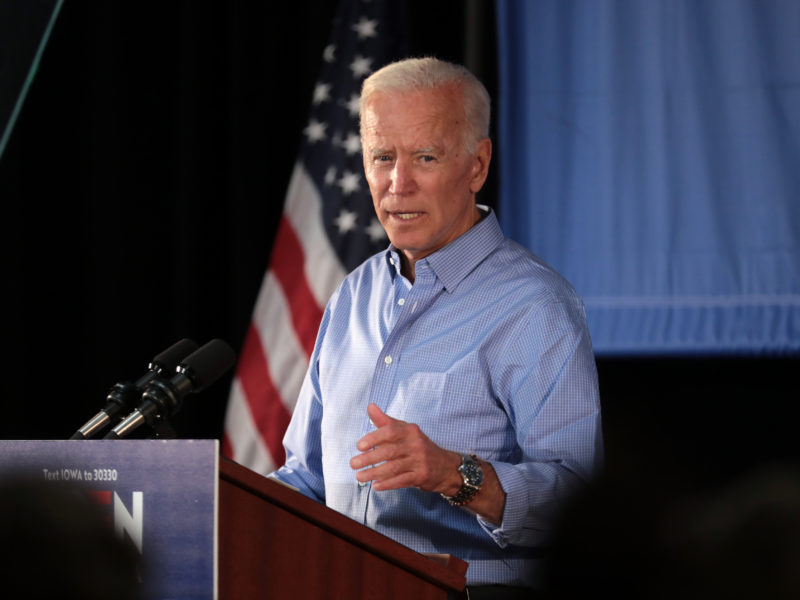By Danielle Lupton, and guest contributor Michael Robinson
Former Vice President Joe Biden has rapidly emerged as the frontrunner in the Democratic race to the White House. While many Democratic candidates relied on their domestic policy to develop a national profile, Biden leveraged his name recognition and experience in international affairs—including his brand as heir apparent to the Obama legacy. What would a Biden administration’s take on foreign policy look like? Here, we break down key aspects of Biden’s foreign policy based on his campaign statements, past positions, and debate comments.
What would Biden’s signature foreign policy position be?
Biden’s statements on the campaign trail and the debate stage focus on reasserting American leadership in international affairs. Biden believes President Trump has abdicated traditional US global leadership in favor of an “America First” policy that many construe as “America Alone.”
Biden wants to change this. On the campaign trail, he has stated that one of his “top diplomatic” priorities is a wholesale effort to rejoin international institutions. Rather than focus on a single issue, Biden would combat climate change, restore security partnerships, and strengthen multilateral frameworks. Biden’s campaign has called for a first-term global “Summit for Democracy” to prevent democratic “backsliding,” combat corruption in places like Central America and push back on malign influence from the “kleptocratic” Russian regime.
How does Biden compare to Bernie Sanders in foreign affairs?
Entering the campaign, Biden had a strong advantage over Sanders and the rest of the democratic field in his credibility on foreign affairs, experience that saw him brought onto the Obama ticket in 2008. Throughout the campaign, Biden has leveraged this experience. Although Sanders made frequent appeals to reduce US military presence abroad, Biden’s edge on foreign policy was solidified across the primaries by Sanders’ focus on the economy and healthcare.
Indeed, Democratic voters believe Biden has an experienced hand in foreign affairs. A March 2020 CNN poll found that two-thirds (67 percent) of respondents believe Biden is best served to handle foreign affairs (to Sanders’ 23 percent). As the government works to organize a coherent response to the new coronavirus, exit polls from the recent “Big Tuesday” primaries placed Biden convincingly ahead on the issue of crisis management. These are encouraging numbers for Biden if he heads into the general election, where executive leadership is likely to be a central subject of debate and is bolstered by waning Republican dominance over national security.
How would a Biden administration tackle transnational challenges?
Recent polls cite transnational issues as key concerns among Democratic voters, especially climate change. But Biden has had to fight off attacks that he has not taken the issue seriously enough. Climate activism group the Sunrise Movement endorsed Sanders after rating Biden the worst of the front-runner candidates on the issue.
Nonetheless, the Biden campaign advocates strongly for affirmative measures to combat climate change and address the “void left by the Trump administration’s inaction.” Biden has called for slashing foreign aid to coal-fired power plants, improving transition assistance to fossil-fuel workers, and moving the US economy to a “net-zero” emission level by 2050. This brings him into step with a Democratic electorate that believes the government does “too little” on the issue.
Biden has also heavily criticized the Trump administration’s response to the new coronavirus pandemic, emphasizing the need for “science-based expert advice.” The campaign’s plan to combat COVID-19 stresses the necessity of both a public health and economic response to the outbreak.
What are the biggest changes a Biden administration would make in foreign policy?
A Biden presidency would likely mean aggressive shifts to re-establish many of the American priorities and practices that existed under previous administrations. Biden strongly advocates for re-joining and restoring the Paris climate agreement and the Iran “nuclear deal.” His campaign has called for American leadership in human rights advocacy, such as against the internment of the Uighurs in China’s Xinjiang province.
Biden has also called for strengthening US leadership of “an alliance of nations with shared values and interests,” including NATO. He has committed to undoing much of the Trump era immigration and asylum policies, ending the “national emergency” at the border, and re-enacting the Deferred Action for Childhood Arrivals (DACA) program through executive action.
Not all policy initiatives under Biden would depart from the status quo. Biden advocates for the return of American forces from Afghanistan within his first term, which is in line with the Trump administration’s aim to “end forever wars” in the region. On trade, Biden supports the re-negotiated free trade agreement (USMCA) and “agrees with Trump that China is breaking international trade rules,” although he disagrees with Trump’s “self-defeating” trade war.
Some of the biggest shifts in foreign policy may emerge from the simple resumption of pre-Trump executive practices that have since fallen into disuse. A Biden presidency would almost certainly mean the resumption of a national security decision-making process akin to past administrations; a less combative relationship with intelligence agencies; and less personnel turnover in key cabinet posts. Perhaps least controversially (but still significant), Biden would resume the practice of daily White House press briefings, now stalled for a continuous year.
How will Biden’s foreign policy impact his chances in the 2020 election?
The shifting global and national landscape will almost certainly highlight the contrasts between a Biden presidency—campaigning for a “return to normalcy”—and the perceived disorder of the Trump administration. The Trump administration’s management of the recent flashpoint with Iran and patchwork response to the new coronavirus pandemic has drawn attention to the significance of executive leadership and revealed the negative impact of widespread bureaucratic vacancies in key positions.
More pointedly, Biden’s election prospects are circumscribed by an electorate increasingly faced with challenges that transcend international boundaries, like pandemic disease, transnational terrorism, and refugee flows. Foreign policy issues have not traditionally made the difference at the ballot box; however, Trump’s tenure has made voters acutely aware of international challenges. The public’s views on trade, cybersecurity, and immigration have changed dramatically and in line with partisan identity, creating an opportunity for the Biden camp come November.
Danielle L. Lupton (@ProfLupton) is an Assistant Professor of Political Science at Colgate University and the author of Reputation for Resolve: How Leaders Signal Determination in International Politics. Michael A. Robinson (@m_robinson771) is an Assistant Professor of International Affairs at the US Military Academy at West Point and an active-duty Army strategist. The views expressed are those of the author and do not reflect the official policy or position of the Department of the Army, the US Military Academy, the Department of Defense, or any part of the US government.






